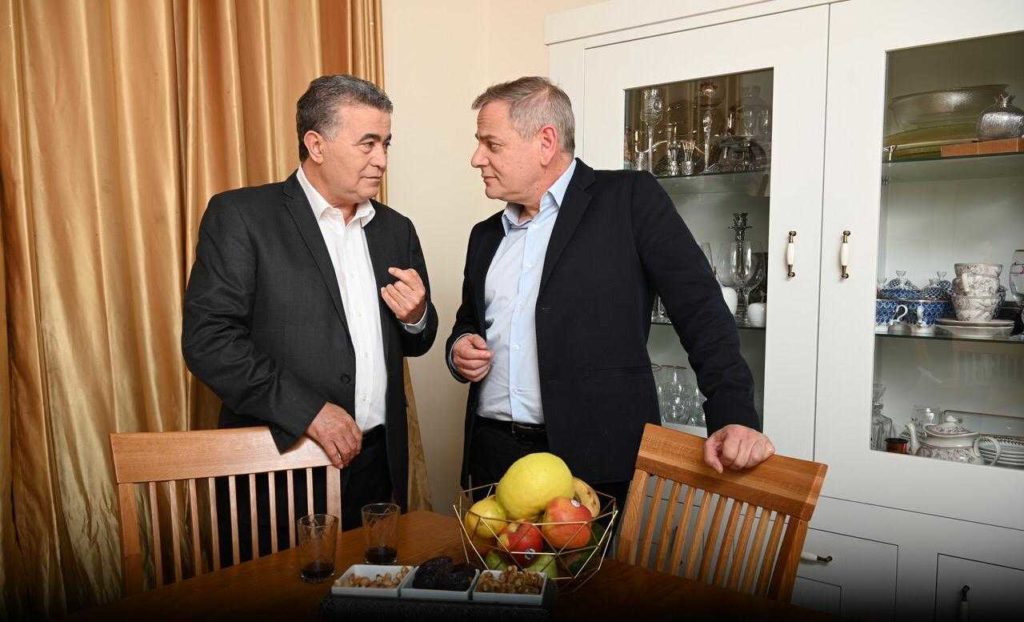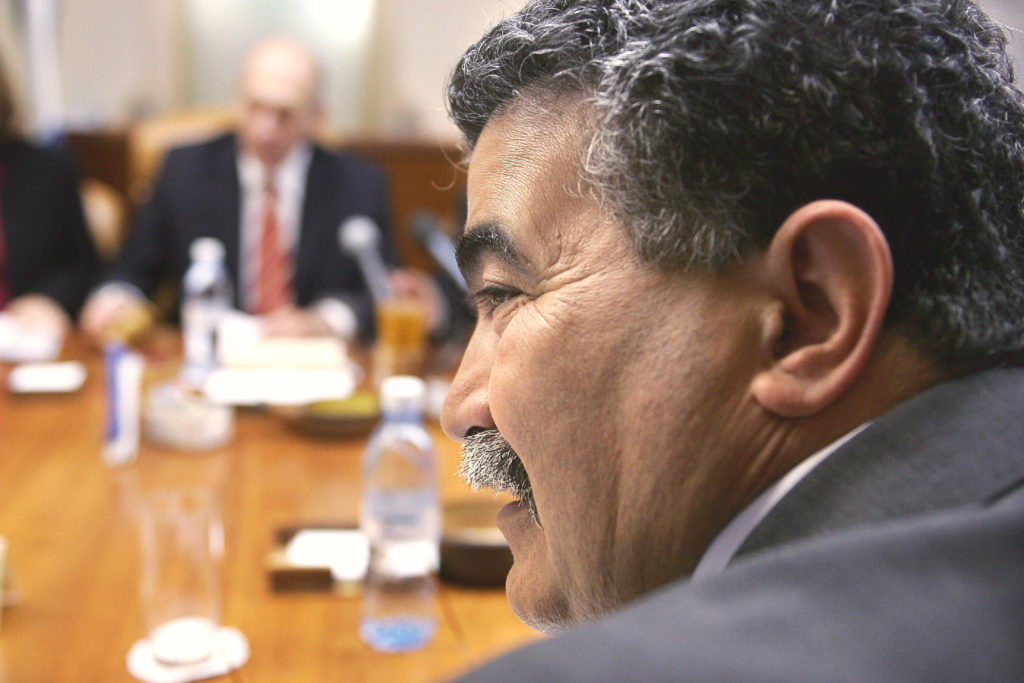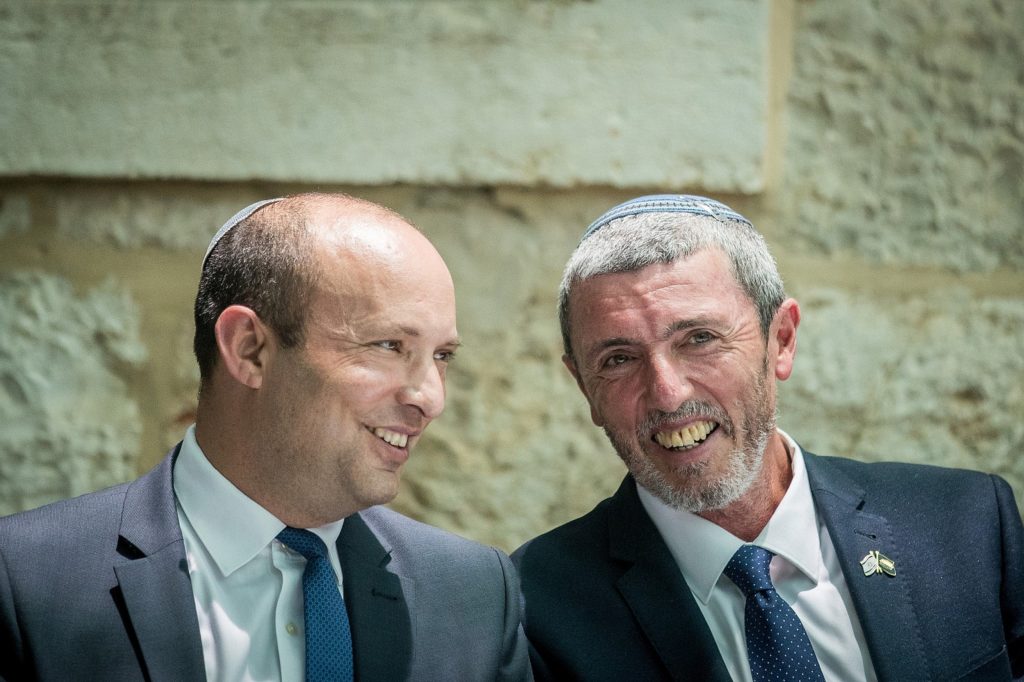Australia/Israel Review
The merging margins of Israeli politics
Jan 31, 2020 | Amotz Asa-El

Israel was searching its soul and licking its wounds in the aftermath of the 1973 Yom Kippur War when the late Labor Party firebrand Shulamit Aloni (1927-2014) split away from her political home and established her own party to run in the December 1973 election. She won three Knesset seats.
Assertive, defiant, and eloquent, the Polish-born anti-clerical crusader challenged the ruling party’s long-standing alliance with religious parties, demanding civil marriages be introduced, as well as the establishment of a Palestinian state and the expansion of social spending.
Her party, then called by the acronym Ratz (“Running”) and later Meretz (“Energy”), became the emblem of the ideological left and a fixture in the Knesset, peaking in 1992 with 12 of its 120 seats.
That achievement made Meretz a major partner in the Labor-led Rabin Government that produced the 1993 Oslo Accords between Israel and the Palestine Liberation Organisation. Meretz took pride in its impact, and claimed, convincingly, that the ruling Labor party had adopted its smaller sibling’s point of view, and thus was now rewriting the history of Israel and the Middle East.
Twenty-seven years on, the two siblings, Labor and Meretz – now both threatened with electoral extinction – have returned to each other’s arms. This election they are running under a joint ticket called Emet (Truth), with brave hopes to restore the political relevance of the Israeli left.
Between them, the two leaders of this new formation bring to the table pretty much everything one could hope for in a left-liberal political ticket.
Labor’s Amir Peretz, 67, is a former chairman of the Histadrut labour federation, a position in which he earned respect, even among the corporate tycoons he confronted daily, as an authentic and effective representative of the working class.
Meretz’s Nitzan Horowitz, 54, is an environmental activist and LGBT rights crusader who is himself openly gay. He has been well-known and popular since the 1980s due to his journalistic career, particularly during his long years as foreign editor on Channel 10 TV news.
Their social backgrounds also complement one another. The Moroccan-born Peretz arrived in Israel with his parents as a child, and is a resident – and former mayor – of Sderot, the working-class city facing the Hamas-controlled Gaza Strip that has borne much of the brunt of the repeated violence emanating from there. Peretz, therefore, represents both the social and geographic periphery.
Horowitz, by contrast, is a native of affluent Rishon Lezion south of Tel Aviv, a trained lawyer and media celebrity who, in his thirties, was the Washington correspondent for the broadsheet Haaretz. He is therefore seen as a representative of Israel’s urban, secular, liberal elites.
In addition, the joint Labor-Meretz ticket also includes Maj-Gen (res) Yair Golan, until recently the IDF’s deputy chief of staff, and lawyer Orly Levy-Abekasis, a popular social activist and prolific lawmaker who is also the daughter of former foreign minister David Levy. The elder Levy, now 82, was once a major leader of the centre-right Likud party and symbol of its working-class and peripheral support base.
These names and the rest of Emet’s roster should be very electorally promising – if not for the crisis of its left-wing ideology, both internationally and locally.
Internationally, left-leaning parties are under threat throughout the West, as seen most recently in Britain’s general election, where Labour was trounced, and before that in Australia, Germany and France. The global quest for “compassionate capitalism” in the aftermath of the 2008 global financial meltdown seems to have produced a populist resurgence rather than a socialist renaissance.
The Israeli left’s effort in recent years to seize the political agenda and woo mainstream voters has focused on a vigorous campaign criticising the government’s handling of Israel’s major new offshore gas finds. But this has not succeeded.
This campaign claimed that the offshore gas fields would be undertaxed, and outsourced to a monopoly that will rob the public of what should be a possession of the Israeli people as a whole.
The Government, however, has raised the level of royalties from the gas field, divided the fields among competing developers, allied with Cyprus and Greece to pipe gas to Europe, and struck multi-billion-dollar export deals with Egypt and Jordan, both of which began receiving Israeli gas in January.
The public seems largely content with this, and unconvinced by the economic left’s contention that they are being robbed of their rightful dividends from the gas bonanza.
Israel’s gas saga is a microcosm of the economic left’s failure almost everywhere to convince middle-class voters that it has the solutions for the current crises of employment, taxation, opportunity, and equality.
Yet the Israeli left’s woes have been compounded by the uniquely Israeli context of the Arab-Israeli conflict.
The Oslo Accords that Labor and Meretz delivered last century are seen today by most Israelis as a failure – including by many who voted in 1992 for Yitzhak Rabin, who signed them, and those who voted in 1999 for Ehud Barak, who went on to lead the failed peace negotiations with Yasser Arafat in 2000-2001.
Labor has not only failed to win an election since 1999, it has steadily shrunk from 44 Knesset seats in 1992 to a mere six in last September’s election, only one seat more than its historic satellite, Meretz, whose following has also been more than halved over the same period.
Pundits agree the crisis experienced by both parties reflects the Israeli mainstream’s shift toward the centre-right, now represented by the Knesset’s largest faction, the new Blue and White party led by former IDF chief of staff Benny Gantz.
Efforts by Labor leaders in recent years to downplay any expectation of a comprehensive deal with the Palestinians in the foreseeable future have failed to impress voters. Oslo is perceived as a failure and trauma that spawned much violence – and as Labor’s responsibility.

Peretz, seen here in 2007, previously served as Defence Minister in Ehud Olmert’s government
Peretz’s career is an embodiment of Labor’s predicament.
Originally a peace enthusiast and a member of the late Shimon Peres’s inner circle, Peretz has been identified for decades with Labor’s left flank not only on social and economic issues but also in terms of advocacy of a sweeping peace deal with the Palestinians.
Subsequent events, however, including a stint as defence minister that ended after the inconclusive Second Lebanon War of 2006, made Peretz conclude that Labor must move to the centre, and thus avoid an alliance with Meretz. Circumstances, however, ultimately militated against his stance.
With polls suggesting that both Labor and Meretz were in danger of not passing the electoral threshold of 3.25% in the upcoming poll on March 2, pressure mounted in both parties to run together. Most effective was an emphatic public call for a joint run from Avraham Shochat, now 83, a respected party veteran who served as finance minister in the governments of Rabin, Peres and Barak.
The joint ticket guarantees the Emet party will be comfortably above the electoral threshold, but a scenario whereby it becomes a major player in the aftermath of the March 2 election is still difficult to imagine.
Polls suggest it will garner perhaps 10 seats, and coalition arithmetic suggests it can at best hope to become a third wheel in a Blue and White-led coalition that will also have to include conservative parties like former defence minister Avigdor Lieberman’s Yisrael Beitenu, or Interior Minister Aryeh Deri’s Shas.
In the more likely scenario whereby it will be relegated to the opposition, Labor and Meretz will have to spend the upcoming years attempting to modernise and reformulate their plans for delivering prosperity to the working class, dignity to the downtrodden, and peace in our time.
Yet one ray of light supporters of the Emet alliance can point to is the mutual respect between Labor’s Peretz and Meretz’s Horowitz.
In a curious inversion of these dynamics, the Israeli political parties at the opposite end of the spectrum have also merged, but the outcome looks more like a bag of angry cats than a harmonious whole.
The story began when Education Minister Rafi Peretz (no relation to Labor’s leader), leader of Orthodox-nationalist Bayit Yehudi (“Jewish Home”), coopted Otzma Yehudit (“Jewish Power”), an extreme-right party linked with disciples of the late racial demagogue Rabbi Meir Kahane. Before being shot dead in 1990 by an Egyptian-American in New York, Kahane’s platform was found to be racist by the Knesset and then the Israeli Supreme Court, thus barring him from running for re-election.
Meanwhile, Prime Minister Binyamin Netanyahu pushed hard for a merger between Peretz’s expanded party and Defence Minister Naftali Bennett’s New Right, a combination of secular and religious nationalists who advocate the West Bank be fully integrated into Israel. Netanyahu feared that one or more of the parties to the right of Likud could fail to pass the electoral threshold, thus wasting votes crucial to any hope he has of forming a stable coalition government.
Bennett however refused to play by Netanyahu’s script and said he would join Peretz only if he undid his alliance with Otzma and its leader, maverick lawyer Itamar Ben-Gvir. As Bennett publicly noted, Ben-Gvir notoriously has a photo hanging on the wall of his living room of Baruch Goldstein, the extremist physician who in 1994 massacred 29 innocent Muslim worshippers in a Hebron mosque before himself being killed.
Asking rhetorically “how illogical can this get,” Bennett compared running alongside Ben-Gvir to tolerating an American congressman having a photo in his living room of a man who massacred Jews in a synagogue. Ridiculing the situation, Ben-Gvir said in a prime-time TV interview that he was willing to remove the photo from his living room wall for the sake of the nation’s future.

Naftali Bennett and Rafi Peretz: Main players in the new right-wing Yemina alliance
In the end, Rabbi Peretz, facing Netanyahu’s pressure from one side and Bennett’s firm resistance from the other, ultimately surrendered to Bennett. Their two parties, Jewish Home and New Right, along with Transport Minister Bezalel Smotrich’s National Union party, will therefore run on a joint ticket called Yemina (“Rightward”) without Otzma. Relations between its three leaders – Bennett, Peretz and Smotrich – are frosty at best.
Forecast to garner up to 10 seats, this formation, too, is expected to be an auxiliary to someone else’s main act – in their case, Netanyahu’s and his Likud party.
These automatic affiliations are reflected in the responses of the two new alliances to Netanyahu’s request that the outgoing Knesset grant him immunity from facing a trial on corruption charges in three cases until he leaves office.
Labor-Meretz is fully on side with Blue and White’s efforts to get the current Knesset to take up, and then reject Netanyahu’s request. Yemina is fully in sync with Netanyahu’s immunity demand specifically, with his plans to delay the process of considering his request until after the March 2 election, and with his quest to remain in power generally.
In a nutshell, these entrenched attitudes on the opposite sides of the rearranged political spectrum represent what many Israelis feel their third election in 11 months is all about.
Tags: Israel






